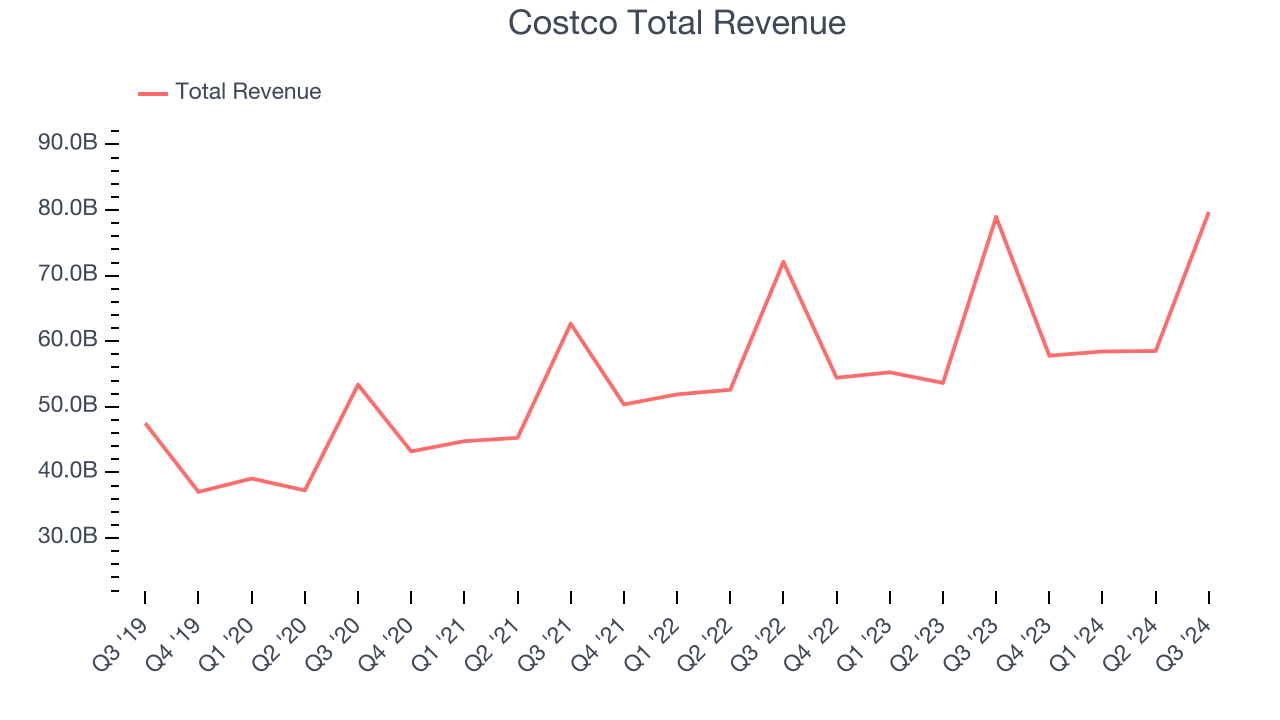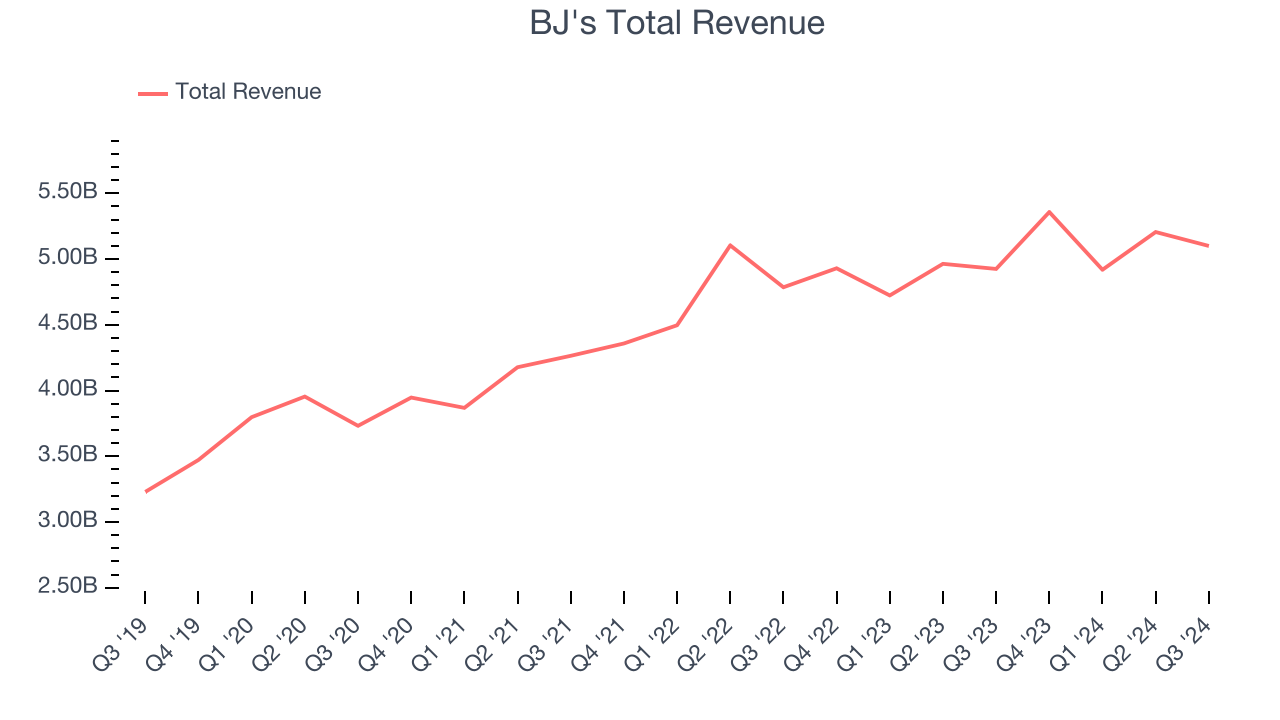
Looking back on large-format grocery & general merchandise retailer stocks’ Q3 earnings, we examine this quarter’s best and worst performers, including Costco (NASDAQ: COST) and its peers.
Big-box retailers operate large stores that sell groceries and general merchandise at highly competitive prices. Because of their scale and resulting purchasing power, these big-box retailers–with annual sales in the tens to hundreds of billions of dollars–are able to get attractive volume discounts and sell at often the lowest prices. While e-commerce is a threat, these retailers have been able to weather the storm by either providing a unique in-store shopping experience or by reinvesting their hefty profits into omnichannel investments.
The 4 large-format grocery & general merchandise retailer stocks we track reported a mixed Q3. As a group, revenues were in line with analysts’ consensus estimates.
Thankfully, share prices of the companies have been resilient as they are up 5.2% on average since the latest earnings results.
Costco (NASDAQ: COST)
Designed to be a one-stop shop for the suburban consumer, Costco (NASDAQ: COST) is a membership-only retail chain that sells groceries, apparel, toys, and household items, often in bulk quantities.
Costco reported revenues of $79.7 billion, flat year on year. This print was in line with analysts’ expectations, and overall, it was a satisfactory quarter for the company with an impressive beat of analysts’ gross margin estimates.

Costco delivered the slowest revenue growth of the whole group. Interestingly, the stock is up 9% since reporting and currently trades at $982.85.
Is now the time to buy Costco? Access our full analysis of the earnings results here, it’s free.
Best Q3: BJ's (NYSE: BJ)
Appealing to the budget-conscious individual shopping for a household, BJ’s Wholesale Club (NYSE: BJ) is a membership-only retail chain that sells groceries, appliances, electronics, and household items, often in bulk quantities.
BJ's reported revenues of $5.10 billion, up 3.5% year on year, in line with analysts’ expectations. The business had a strong quarter with an impressive beat of analysts’ EBITDA and EPS estimates.

The market seems happy with the results as the stock is up 12.1% since reporting. It currently trades at $96.
Is now the time to buy BJ's? Access our full analysis of the earnings results here, it’s free.
Weakest Q3: Target (NYSE: TGT)
With a higher focus on style and aesthetics compared to other large general merchandise retailers, Target (NYSE: TGT) serves the suburban consumer who is looking for a wide range of products under one roof.
Target reported revenues of $25.67 billion, up 1.1% year on year, falling short of analysts’ expectations by 0.9%. It was a disappointing quarter as it posted full-year EPS guidance missing analysts’ expectations.
Target delivered the weakest performance against analyst estimates in the group. As expected, the stock is down 17.1% since the results and currently trades at $129.34.
Read our full analysis of Target’s results here.
Walmart (NYSE: WMT)
Known for its large-format Supercenters, Walmart (NYSE: WMT) is a retail pioneer that serves a budget-conscious consumer who is looking for a wide range of products under one roof.
Walmart reported revenues of $169.6 billion, up 5.5% year on year. This result topped analysts’ expectations by 1.8%. Overall, it was a strong quarter as it also recorded an impressive beat of analysts’ gross margin estimates and a decent beat of analysts’ EPS estimates.
Walmart pulled off the biggest analyst estimates beat and fastest revenue growth among its peers. The stock is up 13.4% since reporting and currently trades at $95.33.
Read our full, actionable report on Walmart here, it’s free.
Market Update
Thanks to the Fed's series of rate hikes in 2022 and 2023, inflation has cooled significantly from its post-pandemic highs, drawing closer to the 2% goal. This disinflation has occurred without severely impacting economic growth, suggesting the success of a soft landing. The stock market has thrived in 2024, spurred by recent rate cuts (0.5% in September and 0.25% in November), and a notable surge followed Donald Trump’s presidential election win in November, propelling indices to historic highs. Nonetheless, the outlook for 2025 remains clouded by potential trade policy changes and corporate tax discussions, which could impact business confidence and growth. The path forward holds both optimism and caution as new policies take shape.
Want to invest in winners with rock-solid fundamentals? Check out our Top 5 Quality Compounder Stocks and add them to your watchlist. These companies are poised for growth regardless of the political or macroeconomic climate.
Join Paid Stock Investor Research
Help us make StockStory more helpful to investors like yourself. Join our paid user research session and receive a $50 Amazon gift card for your opinions. Sign up here.




